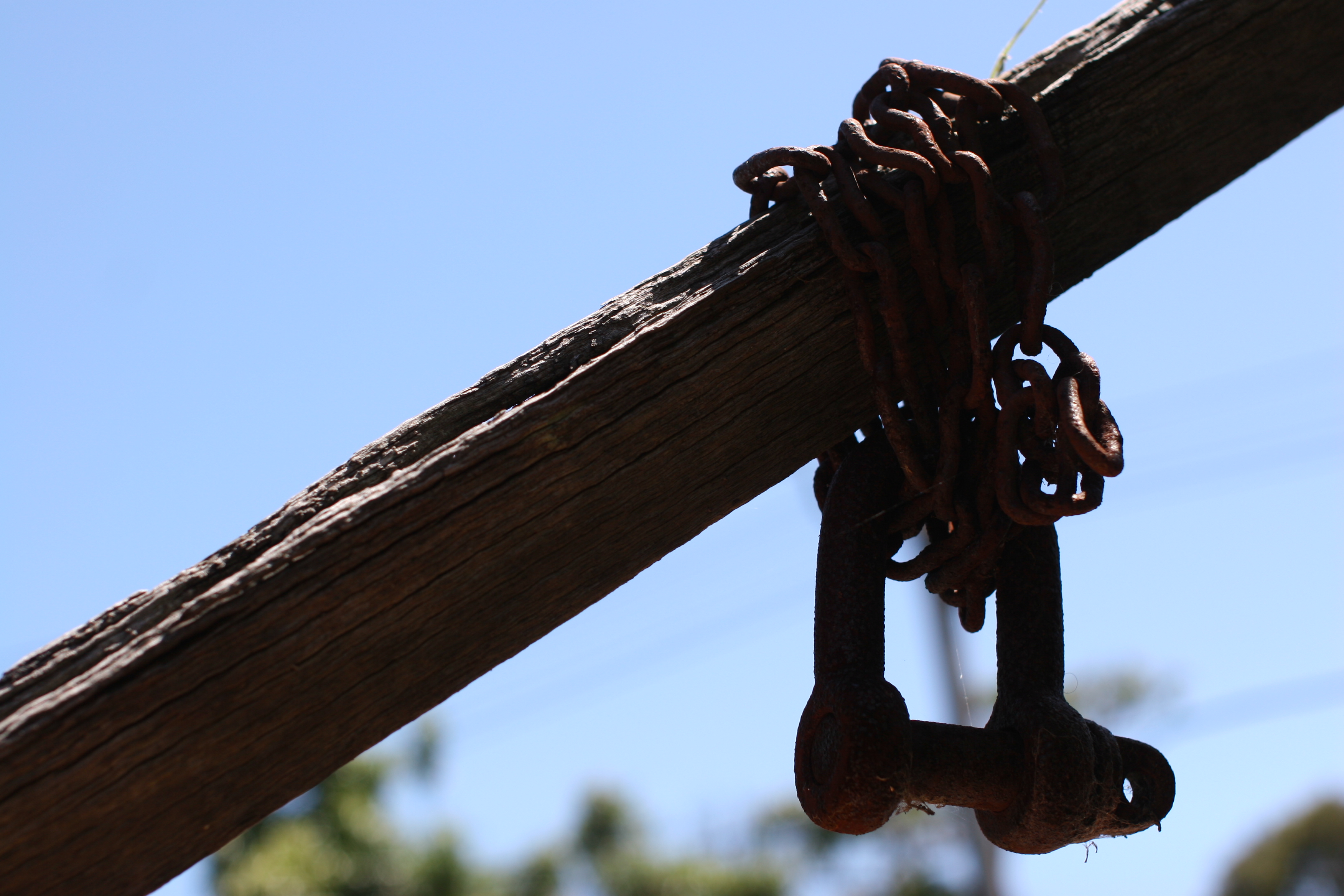During last year’s coverage of the Oscar Pistorius trial a South African legal commentator said something that stuck in my brain. Trying to anticipate Judge Masipa’s ruling he was talking about what punishment the accused’s crime would warrant and by way of offering a context of scale of punishment in relation to particular crimes he mused that while Pistorius was being tried for murder, an indisputably serious offence that should incur an equally serious penalty, for the lesser crime of stealing a loaf of bread “death is not a proportional sanction”, the implication being, I presumed, that death may have been a proportional sanction for Oscar. That’s not how it played out in the end.
“Death is not a proportional sanction.”
Death as a ‘sanction’ is very topical here in Australia at the moment as two members of the Bali Nine (the name given to a group of Australians who ten years ago were arrested in Bali for attempting to smuggle a substantial quantity of heroin from Indonesia to Australia), who are on death row in Kerobokan prison have just had their appeals for clemency rejected by the Indonesian president and are to be executed by firing squad. The two men in question were 21 and 23 when they were arrested. Young men. They committed a crime in a country where, if caught, the consequences were always going to be extremely punitive, if not fatal. And they did get caught. But now they are older. They are reformed and rehabilitated but not in the eyes of a government determined to send a strong signal to would be drug traffickers, something they ably demonstrated last week when executing six other offenders.
“Death is not a proportional sanction.”
Look at that sentence again. Taken in isolation it could mean that there is something more serious than death that is a proportional sanction. Like what? “For your crimes against humanity you are sentenced to compulsory consumption of Big Brother, X-Factor, Uzbekistan’s Got Talent and all other execrable prime-time effluent that will result in total cerebral implosion in a matter of weeks.” That would be a fate worse than death, as they say. But death is a serious subject so I shouldn’t be flippant. My extended family has been touched by three bereavements in the last year two of which were sudden and shocking and one of those was even preventable. The other came as a surprise too but only because the news of terminal illness was shared very late in the day at the request of the deceased. None of those deaths were sanctions but they did seem random and unfair. I cried for each of them. Or more accurately, I cried for myself at the pain of their full stop.
“Death is not a proportional sanction.”
I think what that legal commentator really meant was, for stealing a loaf of bread death is a disproportionate sanction. To me, this sentence is absurd, regardless of context. How can something as final as death be regarded as a sanction? A sanction is something to discourage or inhibit. Something to give one pause for thought. Something that may offer an opportunity for reflection and reconsideration. Does death achieve any of those things? Not in this life! A sanction is, in fact, a threatened penalty for the disobeying of a rule or law. It is also the granting of a licence. The sanction of death therefore means you are given permission to die. How lovely. As sanctions go, death feels something of a misnomer. Maybe I’m being dumb and simply misunderstanding the word but doesn’t a sanction suggest that it is survivable? That you will move on once you have taken your medicine? As far as I know, death doesn’t really offer those options.
“Death is never a proportional sanction.”
I believe that’s the sentence I really wanted to hear. My wife had a significant birthday around the time of the last throes of the Gaddafi regime (no thanks to this distinguished gentleman) in Libya. Taking in the accounts of his corruption and cruelty enraged my wife and she wondered aloud why he wasn’t simply shot or somehow terminated to end his reign of injustice and oppression. She wished him dead. On the night of her birthday party my wife knew she was going to be overwhelmed with emotion during her planned speech to the assembled guests and to prevent this from happening she enlisted the help of those present by asking them to shout out one word every time she looked like she was about to cry. This word would instantly banish all feelings of tenderness and love and replace them instead with all-consuming rage. And so it was that throughout her very moving and indeed, tearful, speech she was inundated with shrieks and roars of ‘Gadaffi! Gadaffi!’ until her composure was restored. My point is not that anger negates love, related themes of which I have touched on before here and here, but that in spite of the righteousness of my wife’s sentiments, I only agreed with her to a point.
“Death is always a disproportional sanction.”
That’s definitely the sentence I wanted to hear. I didn’t wish Gadaffi dead. I don’t wish anyone dead. I don’t think death is the answer to anything. Unless the question is ‘what is the opposite of life?’ Perhaps I am like Tolkien’s Gandalf the Grey of The Hobbit and The Lord of the Rings fame. No, I don’t have a magic staff nor do I gad about in a navel-length beard dressed in musty old curtains. It is more that I have a deep distrust of the righteousness of taking any person’s life, irrespective of their wrongs. Ian McKellen ably brings the required gravitas to his rendering of Tolkien’s bit of wisdom. And when society decrees death is the answer but they make a mess of dispensing their ultimate justice? Not pleasant as recent botched executions in America testify. All life is precious? I don’t think I really believe that but who am I to judge who should live and who should die? And whose gift should that be? Who signs that piece of paper?
“Death is always a disproportional sanction.”
That’s the sentence I need to hear. Despite what I have written above I frequently find myself dishing out remorseless judgement and baying for the blood of the transgressor. In those moments nothing will shift me from my certitude that death is the answer. Not only is it the answer, it is the bitter dessert that is owing for a wasted life. The condemned? Myself. I was ambushed by three very nasty bouts of intense and violent depression over the Christmas/New Year period. They were unexpected in their frequency and their intensity. In their grip I succumbed to the weight of familiar feelings of worthlessness and found myself once more disappeared into a black fantasy of oblivion at my own hand. Grim stuff. Punishing.
But thankfully I am at a place with these episodes that self-harm is never something that becomes a physical reality. I even function and participate socially and otherwise with relative normality. This is measurable progress and I take comfort from it when I recover. However, I want to do better. When I came out from the last of the recent spate of – what – attacks; collapses; moods; descents; assaults; plummets, I reflected very carefully on what I’d just put myself through. I delved and dug and breathed until a little epiphany presented itself. And that epiphany led to this post.
My descents into the darkness are disproportionate sanctions. That they bring with them a death wish should spell that out in very clear terms. A proportional sanction I can handle. One that allows me to learn. One that allows me to survive. One that allows me to grow. Judgement. Death! Who am I to judge anybody? Shouldn’t that include myself? Who am I to judge myself?
That really isn’t a black and white question but then, when we’re dealing with life and death, what is? I wonder if we ever have all the information we need to make a fair judgement. It’s highly unlikely but that rarely seems to stop us. One of my cousins once affectionately nicknamed me ‘Frontline’ as tribute to my tendency to hold forth and pronounce judgement on any and all who provoked my ire. If the name conjures up military images then it occurs to me that too often I’ve waged war when maybe I should have been working for peace. And on that note – Peace.
“Death is always a disproportional sanction.” Do you agree or disagree? Or am I just a woolly liberal?





A brilliant post Dara,I get incredibly angry when i see people harm others and animals and it has to be said i do sometimes wish them dead but if i actually had to be one doing the killing i know it would be impossible but then you look at what people like isis and boko harum are doing and and that feeling of i would like to see these people dead comes back,but no i dont think you are a woolly liberal Sean
Thanks Sean, always appreciate your custom! It’s the pathological ideologues who recruit and brainwash the foot soldiers of ISIS and Boko Harum that disturb me most. They’re the ones who wouldn’t bat an eyelid at the annihilation of every person on the planet in the name of their respective causes. Sticking with the cats isn’t a bad place to start spreading the love…
Thought provoking post as always Dara. We are almost all too quick to judge others and when we judge ourselves and find ourselves wanting we realise it’s not so much humbling but incredibly damaging. It’s a tough lesson and one we are bound to relive I guess. Thanks for such a well written signpost to how we might be different,
Liz
Thanks for your considerate response Liz, so nice to know you’re reading. The Dublin Bookshop days feel a lifetime ago! Many lessons have been learnt and forgotten since then. Hope 2015 is treating you well so far.
Hi Dara,
Thanks for your blog and an opportunity to respond. On first reading it felt like you had opened an envelope of death, however, on re-reading it was easy to see how you consolidated your feelings and included an intimacy that is very hard for most people to communicate verbally.
A tendency to hold forth and pronounce judgement is a release valve, in my view, against all the dreadful behaviour of humanity especially with regard to justice which comes with several tags – price politics and gender. Pistorious has paid an appropriate amount. Gadaffai’s death evoked this response from Defence Secretary Philip Hammond who said about Gaddafi’s death “It’s certainly not the way we do things. We would have liked to see Gaddafi going on trial to answer for his misdeeds”. Now, there’s a very soft word “misdeeds”. I wonder when he would have been put on trial? After he did a Pinochet?
Regards,
Deirdre
Hi D, thanks very much for such a considered response. My release valve gets plenty of use – there’s something a bit unnatural about not venting at all. It’s funny, I’ll give dictators a pass but find myself much more exercised by the petty behaviour of everyday people. The mini-dictators, if you will…
[…] assert their usefulness to the world. My posts on depression could be retitled How not to Die and How to Keep Things in Perspective. My first ever post here could now be called How to Settle for Less and a very recent one could be […]